Are you tired of hearing conflicting advice about skin care? Do you struggle to separate fact from fiction when it comes to taking care of your skin? You’re not alone. There are many common myths and misconceptions about skin care that can lead to ineffective or even harmful practices. In this article, we’ll debunk five of the most pervasive skin care myths and provide you with the truth behind each one. Whether you're a seasoned skincare enthusiast or just starting out, understanding these myths will help you make better decisions about how to care for your skin.
Myth #1: Sunscreen is Only Necessary on Sunny Days
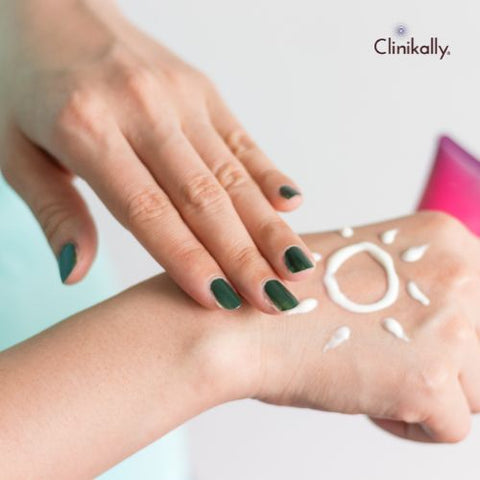
This is a common misunderstanding. Even on cloudy or overcast days, harmful UV rays can penetrate the clouds and cause skin damage. Indeed, up to 80% of UV rays can pass through clouds, and reflective surfaces such as snow, sand, and water can increase UV radiation exposure. As a result, regardless of the weather, it is critical to wear sunscreen with an SPF of at least 30 every day. This can help to protect your skin from premature ageing, sunburn, and even skin cancer.
The Importance of Wearing Sunscreen Every Day, Even on Cloudy or Rainy Days
The key to preserving healthy skin and avoiding UV radiation damage is to wear sunscreen every day, even on cloudy or wet days. Here are a few explanations:
-
UV rays can penetrate clouds: up to 80% of UV rays can penetrate clouds, meaning that you can be exposed to harmful UV radiation even on cloudy or overcast days.
-
UV rays can reflect off surfaces: UV radiation can be reflected by surfaces such as snow, sand, and water, increasing your exposure to harmful rays. This is why, even if you're not directly in the sun, such as at the beach or skiing on a snowy day, you should wear sunscreen.
-
Sun damage can lead to premature ageing: Sun damage can cause fine lines, wrinkles, and dark spots on your skin, making it appear older than it is.
-
Sunburns can be painful and harmful: They are an obvious sign of skin damage, and getting them frequently raises your risk of skin cancer.
-
Skin cancer is a real threat: With over 3.5 million cases diagnosed each year, skin cancer is the most common cancer in the United States. Wearing sunscreen every day is one of the most simple and effective ways to lower your risk of skin cancer.
Understanding the Difference Between UVA and UVB Rays and How They Affect the Skin
The sun emits UVA and UVB rays, two types of ultraviolet radiation that can affect the skin differently.
UVA rays:
-
Compared to UVB rays, UVA rays enter the skin more deeply.
-
Skin ageing, including wrinkles and fine lines, and skin cancer are both brought on by UVA rays.
-
You may be exposed to UVA rays even indoors because they can pass through glass and clouds.
-
UVA rays are present throughout the day, all year-round, regardless of the weather conditions
UVB rays:
-
UVB rays primarily harm the top layer of skin.
-
Sunburns and skin reddening are primarily brought on by UVB rays, which can also cause skin cancer.
-
UVB rays are strongest during the midday hours and are more intense during the summer months
-
UVB rays do not penetrate glass, which means that you are not exposed to them when you are indoors
Every day, use a broad-spectrum sunscreen with at least SPF 30 to protect your skin from both UVA and UVB rays. A broad-spectrum sunscreen helps to block both types of UV radiation and can lower your risk of skin cancer, premature ageing, and other sun damage. Wear protective clothing, seek shade during peak sun hours, and avoid indoor tanning, which can also expose you to harmful UV radiation.
Myth #2: Expensive Anti-Aging Products are Always Better
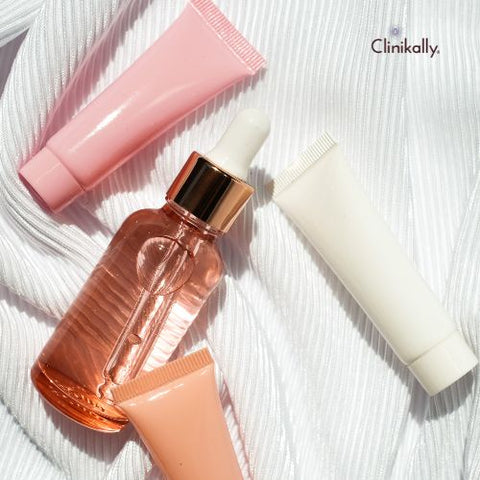
This is a common misunderstanding. The effectiveness of a product is not always correlated with its price, even though expensive anti-aging products may have high-quality ingredients. In some cases, less expensive products may actually have the same active ingredients as more expensive ones. The most crucial consideration when choosing an anti-aging product is choosing one that contains ingredients that have been scientifically proven to work. To lessen the appearance of fine lines, wrinkles, and other signs of ageing, look for ingredients like retinoids, vitamin C, and peptides. It's also very important to keep in mind that the best results come from adhering to a daily skincare routine consistently and religiously. If they aren't used frequently, anti-aging products of all kinds won't work.
The Truth About the Effectiveness of Anti-Aging Products and Ingredients
The appearance of fine lines, wrinkles, and other ageing signs can be improved by anti-aging products and ingredients. The following list of ingredients with potential anti-aging effects is common:
-
Retinoids: Retinoids, including retinol and tretinoin, are vitamin A derivatives that can promote the production of collagen, boost skin cell turnover, and lessen the visibility of fine lines and wrinkles.
-
Vitamin C: Vitamin C is a potent antioxidant that can help shield the skin from environmental stressors like pollution and UV rays. It can also stimulate collagen production and brighten the skin.
-
Peptides: Peptides, which are made up of short chains of amino acids, can help to increase skin elasticity and lessen the visibility of fine lines and wrinkles.
-
Alpha-hydroxy acids (AHAs): AHAs, like glycolic acid and lactic acid, can exfoliate the skin, improve tone and texture, and lessen the visibility of fine lines and wrinkles.
-
Niacinamide: A vitamin B3 in the form of niacinamide can help to brighten skin, increase skin elasticity, and lessen the appearance of fine lines and wrinkles.
It's important to remember that while these ingredients may work, they might not work for everyone and that outcomes can vary. Furthermore, it may take several weeks or even months of regular use to notice appreciable changes in the skin's appearance.
Why Dermatologists Recommend Certain Products Over Others
Based on their knowledge and experience in the field of skin care, dermatologists favour certain products over others. When making product recommendations to their patients, they take into account a number of factors, such as:
-
Ingredients: Dermatologists advise using products with high-quality, clinically tested ingredients that have been shown to be successful in treating a range of skin issues. They take into account the ingredient concentration and formulation, as well as any possible interactions with other goods or drugs.
-
Skin type: When recommending products, dermatologists take into account a patient's skin type and particular concerns. For instance, a lightweight, oil-free moisturiser may be beneficial for someone with oily skin, while a richer, more hydrating formula may be required for someone with dry skin.
-
Safety: Dermatologists only endorse goods that are suitable for their patients and safe to use. They take into account things like allergies, sensitivities, and any underlying illnesses that might have an impact on the skin.
-
Brand reputation: Dermatologists might suggest goods from reputable companies that have a track record of developing efficient and secure skincare products. They might also take into account the brand's dedication to R&D, position on sustainability, and ethical business conduct.
How to Choose the Right Anti-Aging Products for Your Skin Type and Concerns
It can be challenging to pick the best anti-aging products for your skin type and issues. You can use the following advice to help you with the procedure:
-
Determine your skin type: Choosing the appropriate products requires knowledge of your skin type. Decide whether your skin is sensitive, combination, dry, or oily. You can choose products that are suitable for your skin type with the aid of this information.
-
Identify your skin concerns: Choose the particular issues you want to address, such as wrinkles, fine lines, an uneven texture, or hyperpigmentation. This will assist you in selecting goods with ingredients that address those issues.
-
Look for proven ingredients: Look for products that contain ingredients that have been scientifically proven to be effective, such as retinoids, vitamin C, peptides, and AHAs.
-
Consider product formulations: Select goods that have formulations suitable for your skin type. For instance, if you have dry skin, search for products with a richer texture, whereas people with oily skin might prefer lighter formulations.
-
Start with one product at a time: When experimenting with new products, start with just one at a time to avoid overwhelming your skin. This will also assist you in identifying which products are effective for you and which ones are not.
-
Be patient: It may take several weeks or even months for anti-aging products to produce noticeable results. To get the best results from them, use them gradually and consistently.
-
Consult a dermatologist: A dermatologist can help you choose the best anti-aging ingredients and products for your particular skin needs and concerns.
Myth #3: Exfoliating Every Day is Good for Your Skin
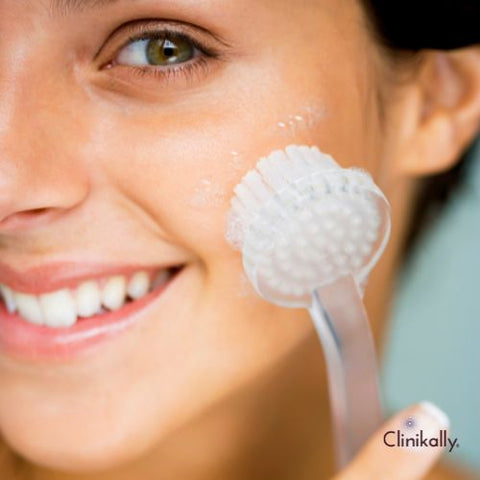
Exfoliating every day is harmful to your skin and is a common misconception. While exfoliation can help remove dead skin cells and improve skin texture, doing so too frequently or aggressively can cause irritation, dryness, and even skin barrier damage. Every 28 to 40 days, the skin goes through a natural exfoliation process in which dead skin cells are shed and replaced with new ones. This process can be hampered by excessive exfoliation, which will lead to an unbalanced skin barrier and increased sensitivity.
Your skin type and concerns will determine how often you exfoliate. Exfoliating 1-2 times per week for normal to oily skin and 1-2 times per month for dry or sensitive skin is generally recommended. When selecting an exfoliating product, choose one that is gentle and appropriate for your skin type. Physical exfoliants, such as scrubs or brushes, should be used sparingly and infrequently. Alpha-hydroxy acids (AHAs) and beta-hydroxy acids (BHAs) are gentler chemical exfoliants that can be used more frequently, but they still need to be used as directed and gradually added to your skincare regimen.
The Risks of Over-Exfoliation and How it Can Damage Your Skin
Your skin can be damaged by excessive exfoliation in a number of ways, including:
-
Skin sensitivity: Exfoliating too much can harm the skin's barrier, making it more sensitive, dry, and irritable.
-
Breakouts: By upsetting the normal balance of the skin's microbiome, excessive exfoliation can lead to an increase in breakouts and acne.
-
Hyperpigmentation: Exfoliating too much can increase melanin production, which can result in hyperpigmentation, dark spots, and uneven skin tone.
-
Premature ageing: Over-exfoliating can hasten the aging process by harming the skin's collagen and elastin fibres, which keep the skin firm and elastic.
-
Increased sun damage: Excessive exfoliation can increase your risk of sunburn, skin cancer, and sun damage by making your skin more vulnerable to the sun.
It's crucial to select gentle exfoliants and use them sparingly if you want to prevent over-exfoliation. Stop using the exfoliant and give your skin time to heal if you experience any signs of sensitivity or irritation. If you have sensitive or acne-prone skin, consider using chemical exfoliants, such as AHAs and BHAs, which are gentler on the skin and less likely to cause irritation than physical exfoliants, such as scrubs or brushes.
The Benefits of Gentle Exfoliation and How to Incorporate it into Your Skincare Routine
Your skin will benefit from gentle exfoliation in a number of ways, including:
-
Improved skin texture: Gentle exfoliation helps to remove dead skin cells and unclog pores, giving skin a smoother, softer, and more even texture.
-
Brighter complexion: By removing dead skin cells and stimulating cell turnover, gentle exfoliation can help to brighten your complexion and reduce the appearance of dull, tired-looking skin.
-
Improved product absorption: By removing the layer of dead skin cells that are on the surface of your skin, exfoliating can help your skin absorb skincare products like oils, serums, and moisturisers.
-
Reduced breakouts: Gentle exfoliation can help to clear blocked pores and get rid of extra oil, which will make acne and breakouts less likely.
To incorporate gentle exfoliation into your skincare routine, follow these steps:
-
Select the ideal exfoliant: Look for a mild exfoliant that is suitable for your skin type. Physical exfoliants like scrubs or brushes can be more abrasive, so if you have sensitive skin, consider using a chemical exfoliant like AHAs or BHAs.
-
Start slowly: If you're new to exfoliation, start by using your chosen exfoliant once or twice a week. As your skin adjusts, you can gradually increase frequency.
-
Apply your exfoliant to damp skin: To help prevent irritation and to make the product easier to spread, apply your exfoliant to damp skin.
-
Massage lightly: For 30 to 60 seconds, gently rub the exfoliant in circular motions onto your skin, taking care to avoid the sensitive skin around your eyes.
-
Rinse thoroughly: To completely remove the exfoliant, rinse your skin with warm water.
-
Moisturise: Follow up with a moisturiser or serum to help soothe and hydrate your freshly exfoliated skin.
Keep in mind that you should pay attention to your skin's needs and modify your exfoliation routine as necessary. Reduce the frequency of use or stop using the exfoliant altogether if you experience any symptoms of sensitivity or irritation.
Myth #4: Natural Ingredients are Always Better Than Chemicals

This is a common misconception. Even though some natural ingredients are good for your skin, not all chemicals are bad. Numerous skincare products, both natural and synthetic, contain chemical elements that have undergone extensive research and efficacy testing. It has been demonstrated that some chemical substances, including hyaluronic acid, niacinamide, and retinol, can improve skin texture, lessen wrinkles and fine lines, and brighten the skin.
Similar to synthetic ingredients, some natural ingredients can also irritate the skin or trigger allergic reactions, so it's crucial to conduct research and conduct a patch test before incorporating them into your skincare regimen. Some organic substances, such as citrus oils or specific essential oils, can increase photosensitivity and the risk of sun damage, whereas other substances, such as coconut oil, can clog pores and make acne worse.
The Truth About Natural Ingredients and Their Effectiveness in Skincare Products
The effectiveness of natural ingredients in skincare products can vary depending on the particular ingredient and the concentration used. Some examples of natural ingredients and their advantages for the skin are as follows:
-
Aloe vera: Aloe vera is renowned for its moisturising and calming qualities. It can help to hydrate the skin, lessen redness, and calm inflamed skin.
-
Green Tea: Green tea contains antioxidants, which can protect the skin from environmental stressors and help to reduce the signs of ageing.
-
Vitamin C: Vitamin C is an effective antioxidant that can lighten skin, lessen hyperpigmentation, and increase collagen synthesis.
-
Honey: Honey is a natural humectant, which means it aids in drawing moisture to the skin. It also has antibacterial properties that can help to calm and heal skin that is prone to acne.
-
Jojoba Oil: The natural oils produced by the skin are very similar to those of jojoba oil, which is a thin oil. It can enhance the skin's texture and elasticity while also hydrating the skin without clogging pores.
It's important to remember that not all natural ingredients are safe or effective, even though they can be good for the skin. Some naturally occurring substances can irritate the skin or cause allergic reactions, while others might not be as strong or efficient as synthetic substances.
Understanding the Science Behind Skincare Chemicals and Their Benefits
Cosmetic ingredients, also referred to as skincare chemicals, are substances that are added to skincare products to improve their stability, efficacy, and safety. These substances can improve skin texture, minimise fine lines and wrinkles, brighten the skin, and shield it from environmental stressors, among other advantages.
Here are some examples of chemicals used in skincare products and how good they are for the skin:
-
Hyaluronic Acid: Hyaluronic acid is a naturally occurring substance that has a 1000-fold water absorption capacity. It aids in hydrating the skin, enhancing its texture, and lessening the visibility of wrinkles and fine lines.
-
Niacinamide: Also known as vitamin B3, niacinamide is a strong antioxidant that can help to lighten skin tone, lessen hyperpigmentation, and enhance the barrier function of the skin.
-
Retinol: A vitamin A derivative, retinol can help to promote collagen production, lessen the appearance of fine lines and wrinkles, and enhance the texture and tone of the skin.
-
Salicylic Acid: A beta-hydroxy acid that can help exfoliate skin, clear clogged pores, and lessen acne outbreaks is salicylic acid.
-
Vitamin C: Vitamin C is an effective antioxidant that can lighten skin, lessen hyperpigmentation, and increase collagen synthesis.
To guarantee their efficacy and safety, these ingredients for skincare have undergone extensive research and testing. Even though some people might be sensitive to certain chemicals, when used in the right concentrations, they are typically safe to use in skincare products.
Why a Combination of Natural and Chemical Ingredients Can be Most Effective
The most effective skincare products often combine natural and chemical ingredients because each kind of ingredient has distinct advantages and disadvantages.
Natural ingredients can have hydrating, anti-inflammatory, and antioxidant effects on the skin. Examples include plant extracts and essential oils. Their potency and stability may not be as high as those of synthetic ingredients, and their effectiveness may vary depending on the weather, the soil, and the harvesting techniques used. More accurate and reliable results can be obtained using peptides, alpha-hydroxy acids, and other synthetic ingredients. To increase their effectiveness and stability, they are frequently formulated in particular concentrations. However, they might be more abrasive on the skin and trigger allergic reactions in some people. By combining natural and synthetic ingredients, skin care products can take advantage of each type's advantages and offer a well-rounded and efficient treatment for a range of skin problems. For example, a moisturiser with hyaluronic acid, a synthetic ingredient, and aloe vera, a natural ingredient, can deeply hydrate the skin and soothe it when it is dry or irritated.
Myth #5: Moisturisers are Only Necessary for Dry Skin Types
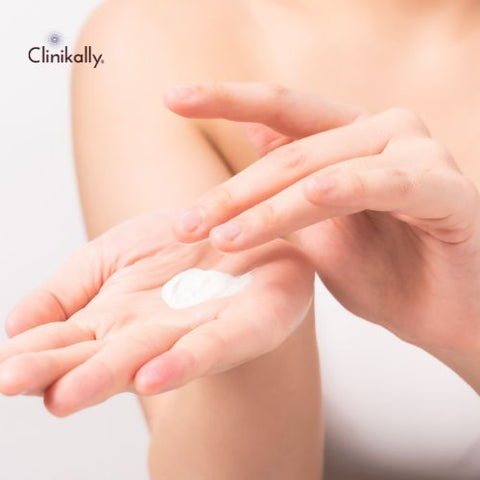
Moisturisers work by creating a barrier on the skin that prevents moisture loss and keeps the skin hydrated. This can help to improve the texture of the skin, minimise the appearance of fine lines and wrinkles, and protect against environmental stressors. Even if you have oily or combination skin, using a non-comedogenic moisturiser can help balance oil production and prevent breakouts. In fact, as the skin tries to make up for a lack of hydration, using harsh cleansers or skipping moisturisers can increase oil production and breakouts.
The Importance of Moisturizers for All Skin Types, Including Oily and Sensitive Skin
It's critical for people with oily skin to use a lightweight, non-comedogenic moisturiser that won't clog pores or worsen breakouts. Some moisturisers formulated for oily skin may contain salicylic acid, which can exfoliate the skin and prevent clogged pores. Using a moisturiser can help to balance oil production and keep the skin from becoming too dry or oily. People with sensitive skin may benefit from using a moisturiser free of potentially irritating ingredients such as fragrances, dyes, and preservatives. Moisturisers for sensitive skin may include calming components like aloe vera or chamomile, which can help lessen inflammation and irritation.
The Role of Moisturizers in Maintaining Skin Barrier Function and Preventing Premature Aging
The function of the skin barrier, which is crucial for healthy and youthful-looking skin, is maintained by moisturisers. In order to keep moisture in and environmental stressors out, the skin barrier serves as a barrier. A variety of problems, such as dryness, sensitivity, and early ageing, can result from the skin barrier being damaged.
Moisturisers work by creating a barrier on the skin that prevents moisture loss and keeps the skin hydrated. This can help to improve skin texture, reduce the appearance of fine lines and wrinkles, and protect the skin from environmental stressors such as pollution and UV radiation. By maintaining the skin barrier, moisturisers can aid in preventing the penetration of allergens and irritants that can result in inflammation and irritation. Moisturisers can delay the signs of premature ageing by keeping the skin firm and elastic. As we age, the skin naturally loses moisture, thins, and becomes more delicate, which can cause wrinkles and sagging. Moisturisers can help to slow down the ageing process and keep the skin looking healthy and youthful by providing hydration and protection against environmental stressors.
Conclusion
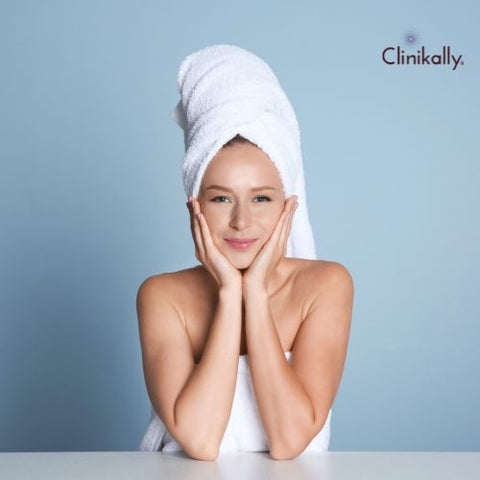
When it comes to skincare, it's critical to be aware of common skincare myths and misconceptions and to seek out accurate information. When it comes to achieving healthy, youthful-looking skin, some of the most common myths, such as the belief that sunscreen is only necessary on sunny days or that natural ingredients are always better than chemicals, can actually do more harm than good. You can make informed decisions about which products to use and how to incorporate them into your skincare routine if you understand the science behind skincare ingredients and the role they play in maintaining skin health.
Whether you want to prevent premature ageing, improve skin texture and tone, or address specific skin issues like acne or hyperpigmentation, there are effective products and ingredients that can help you get there. A holistic approach to skincare that incorporates gentle cleansing, sun protection, and routine application of a high-quality moisturiser can help you preserve the health and appearance of your skin for years to come. And, by staying informed and avoiding common skincare myths, you can ensure that you're making the best decisions for your skin and getting the results you want.









































